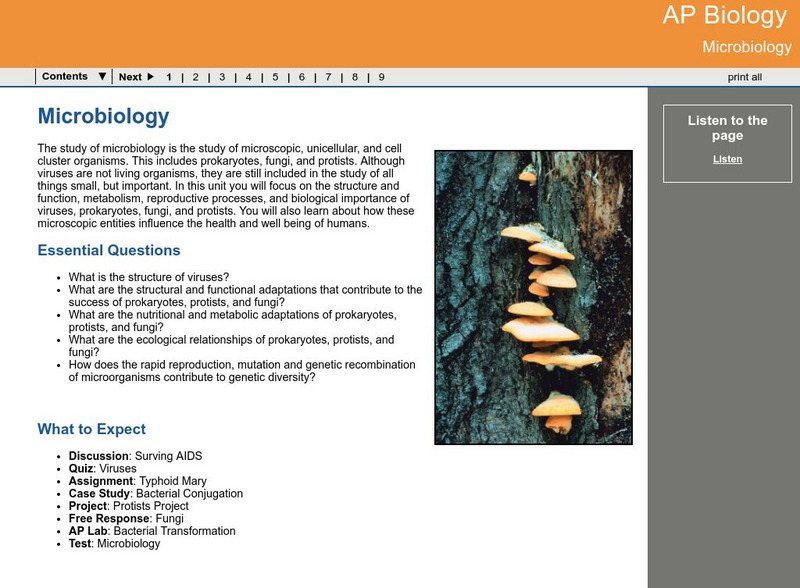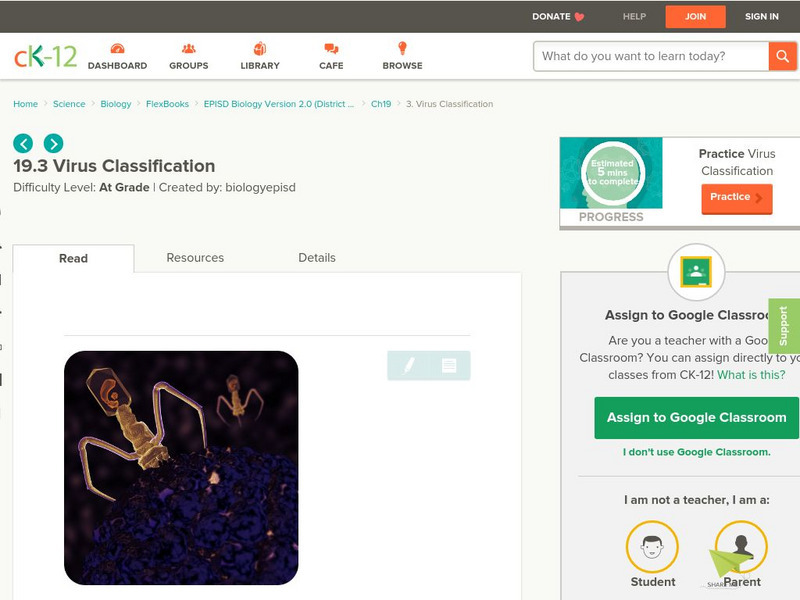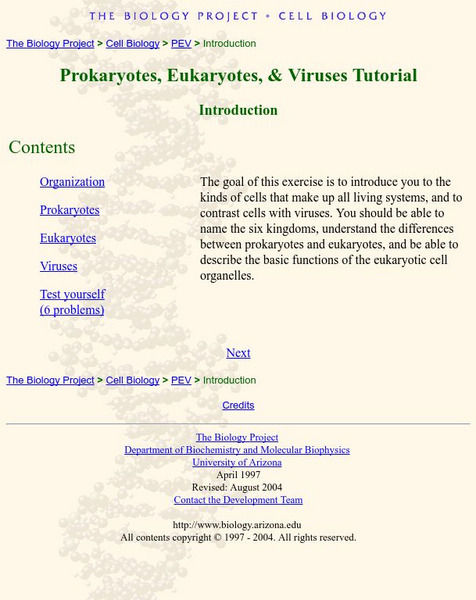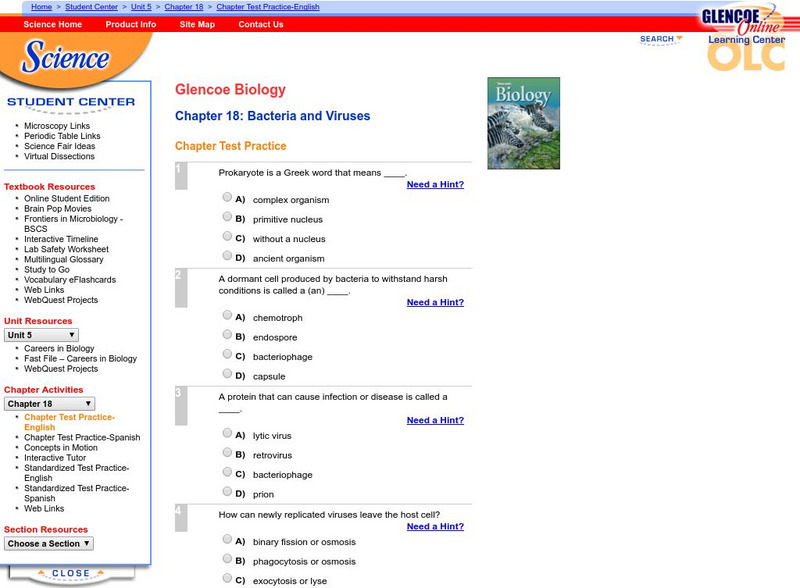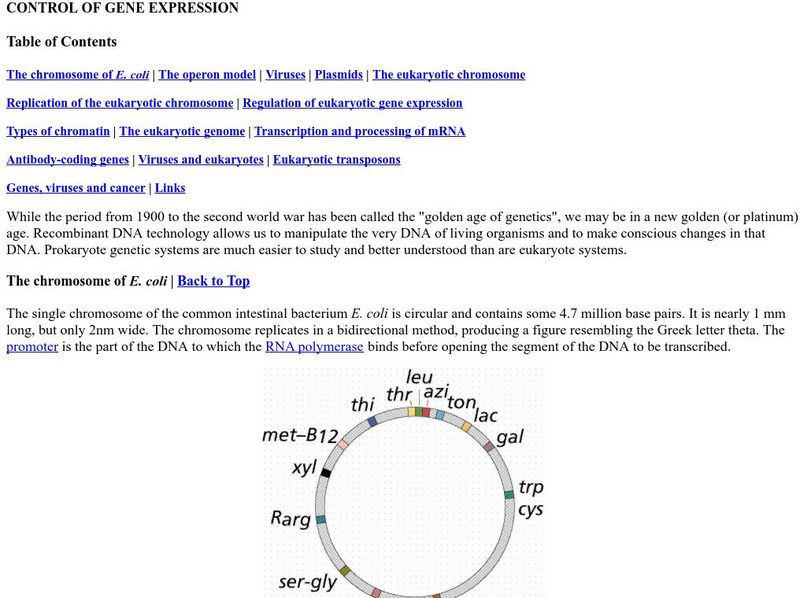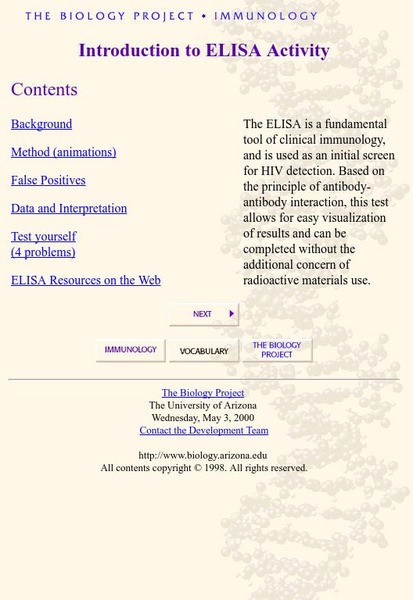Hi, what do you want to do?
University of Michigan
University of Michigan: Viruses
This resource offers an outline of basic virus characteristics, including the reproductive process for viruses.
National Science Foundation
National Science Foundation: How Do Viruses Attack Cells?
Read about new studies in biotechnology that focus on engineering viruses for the purpose of seeking out and destroying specific cells or discovering new genes or drugs.
CK-12 Foundation
Ck 12: Biology for High School
This digital textbook covers core biology concepts and includes interactive features, real-world examples, videos, and study guides.
Estrella Mountain Community College
Online Biology Book: Biological Diversity: Viruses
Through full-color images and concise information, learn about the intracellular parasites, viruses.
Other
The Big Picture Book of Viruses
This resource provides an extensive alphabetical list of viruses.
Georgia Department of Education
Ga Virtual Learning: Ap Biology: Microbiology
In this interactive learning module, students focus on the structure and function, metabolism, reproductive processes, and biological importance of viruses, prokaryotes, fungi, and protists.
Ducksters
Ducksters: Biology for Kids: Viruses
Kids learn about the viruses in the science of biology on this site. Find about how these tiny particles of DNA can make people and animals very sick when they invade a living organism's cells.
Khan Academy
Khan Academy: The Biology of Zika Virus
Learn about the basic biology, origins, life cycle, and symptoms of Zika virus.
Khan Academy
Khan Academy: Virus Structure and Reproductive Cycle Questions
These practice questions pertain to virus structure and reproductive cycle. This study resource from Khan Academy provides practice questions for the MCAT.
Khan Academy
Khan Academy: Multiple Sclerosis and Viruses
Use these practice questions to review multiple sclerosis and viruses.
University of Arizona
The Biology Project: Immunology: Hiv and Aids Tutorial
Read this illustrated tutorial about the relationship between the HIV virus and AIDS. Also contains treatment and diagnosis information.
CK-12 Foundation
Ck 12: Discovery and Origin of Viruses
[Free Registration/Login may be required to access all resource tools.] Describes the discovery of viruses and two hypotheses for the origin of viruses.
CK-12 Foundation
Ck 12: Virus Classification
[Free Registration/Login may be required to access all resource tools.] Discusses the many different viruses and how they are classified.
Khan Academy
Khan Academy: Bacteriophages
Learn about bacteria-infecting viruses, including the lytic and lysogenic cycles.
University of Arizona
Prokaryotes, Eukaryotes, & Viruses
This tutorial compares prokaryotic and eukaryotic cellular organization and contrasts cells with viruses. Includes a practice quiz to test your knowledge.
BiologyWise
Biology Wise: Bacteria vs. Virus
Discusses what bacteria and viruses are and the differences between them.
McGraw Hill
Glencoe Biology: Bacteria and Viruses: Chapter Test Practice
Ten multiple-choice test practice questions covering bacteria and viruses. Students have the opportunity to check their answers after submitting their results.
BiologyWise
Biology Wise: Lytic vs. Lysogenic Cycle
Explains in detail what the lytic and lysogenic cycles of a virus are and the stages of each cycle. Also presents a table highlighting the differences between them.
Estrella Mountain Community College
Online Biology Book: Control of Gene Expression
Online biology textbook illustrates the control of gene expression. Includes information on the role DNA plays in this study of science.
BiologyWise
Biology Wise: Lytic Cycle
Explains what the lytic cycle of a virus is and the steps involved in the process.
BiologyWise
Biology Wise: List of Bacteria
Describes the structure of bacteria, where bacteria can be found, and how they are classified using gram staining. Includes lists of bacteria organized by gram staining response and whether they have a capsule shape. Also includes a list...
BBC
Bbc News: Q&a: Germ Warfare
Read these questions and answers by BBC News Online about biological weapons, the threat of germ warfare, and the politics involved as of 2001. Includes many links to appropriate articles and related information.
University of Arizona
The Biology Project: Immunology: Hiv Simulation: Simulating the Spread of Hiv
This web-based simulation demonstrates potential spread of HIV through a population. Each participant exchanges virtual body fluids with other participants, some of whom are HIV positive. A computer-simulated ELISA will illustrate the...
University of Arizona
The Biology Project: Immunology: Introduction to Elisa Activity
Based on the principle of antibody-antibody interaction, this ELISA test for HIV detection allows for easy visualization of results and can be completed without the additional concern of radioactive materials use.









